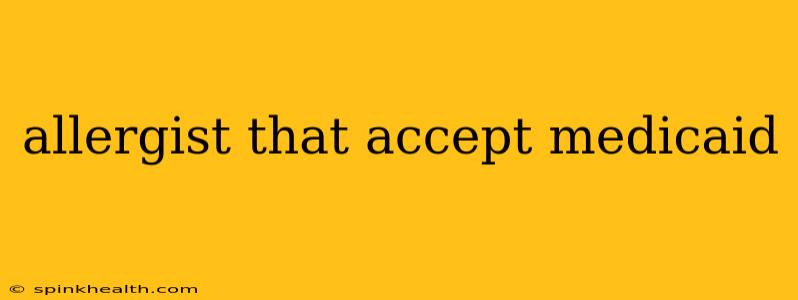Navigating the healthcare system can be challenging, especially when you're looking for specialized care like allergy treatment and are on Medicaid. Finding an allergist who accepts your insurance can feel like searching for a needle in a haystack, but it doesn't have to be. This guide will walk you through the process, offering tips and resources to help you find the right allergist for your needs.
Imagine this: Little Lily is constantly sneezing, her eyes are itchy and watery, and her nose is running. Her parents suspect allergies, but their limited income means relying on Medicaid. Finding an affordable allergist willing to work with their insurance is a top priority. This story isn't uncommon; many individuals and families face similar struggles. This guide is designed to help them – and you – find the help you need.
How to Find an Allergist Who Accepts Medicaid
The search for an allergist who accepts Medicaid starts with a few key strategies:
1. Utilize Online Search Engines: Start by using search engines like Google, Bing, or DuckDuckGo. Refine your search by including your location. For example, type "allergist accepting Medicaid near me" or "Medicaid allergist [your city/state]". Many allergist websites clearly state the insurance plans they accept.
2. Check Your Medicaid Provider Directory: Your state's Medicaid agency maintains a provider directory. This directory lists healthcare professionals, including allergists, who participate in the Medicaid program. Access this directory through your state's Medicaid website. It’s your most reliable source for in-network physicians.
3. Contact Your Medicaid Case Manager or Insurance Provider: If you have a case manager assigned to you through your Medicaid plan, they are an excellent resource. They can help you navigate the system and identify allergists in your network. Similarly, contact your Medicaid provider directly; they can often provide a list of participating allergists.
4. Explore Physician Referral Services: Your primary care physician (PCP) may be able to recommend allergists who accept Medicaid. They often have established relationships with specialists in the area and can guide you toward suitable options.
Frequently Asked Questions (FAQs)
This section answers common questions related to finding an allergist who accepts Medicaid.
What if I can't find an allergist who accepts my Medicaid plan?
This is a frustrating situation, but there are options. You may need to consider:
- Medicaid Appeals Process: If your Medicaid plan denies coverage for an allergist you've chosen, understand the appeals process. There might be grounds to appeal the decision.
- Negotiating Payment Plans: Some allergists may be willing to work with you on a payment plan, even if they don't directly accept Medicaid. Always inquire about this option.
- Sliding Fee Scales: Some community clinics or non-profit organizations may offer allergy services on a sliding fee scale based on your income. This means the cost of care is adjusted to your financial ability.
Do all allergists accept Medicaid?
No, not all allergists accept Medicaid. The participation rate varies significantly by location and individual practice. This is why using the resources mentioned above is crucial.
What information should I provide when contacting an allergist's office?
When you call an allergist's office, be ready to provide:
- Your full name and date of birth
- Your Medicaid card number
- Your PCP's name (if applicable)
- A brief summary of your allergy symptoms
How long does it take to schedule an appointment with an allergist who accepts Medicaid?
The wait time can vary considerably, depending on the allergist's availability and the demand for their services. Be prepared for potential waiting periods.
Are there any resources to help me afford allergy medication even if the visit is covered by Medicaid?
Yes, several organizations offer medication assistance programs. You may be able to find support from pharmaceutical companies or non-profit organizations that provide financial aid for prescription drugs. Contact the allergist's office or conduct online research to find such programs.
Finding the right allergist is crucial for managing allergies effectively. By using these strategies and resources, you can increase your chances of finding an allergist who accepts Medicaid and ensures you and your family receive the necessary care. Remember, perseverance is key, and your health is worth the effort.

